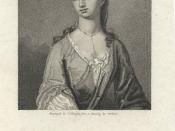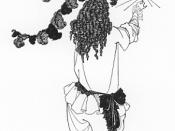Pope's The Rape of the Lock and Richardson's Pamela are apt for comparison in that they both deal with exposing the upper class for having a lack of virtue. Pope's parody is to show up his social peers by bringing to light their vanity and lack of concern for morals. Pamela, on the other hand was originally written to educate the lower classes, which obviously impacts on its handling of virtue.
On a more subtle level, Pamela can be compared to The Rape of the Lock in terms of vanity also. However, this is based on the vanity of Mr B. as opposed to Pamela herself. He is more afraid of his name being marred if Pamela reveals his misconduct than the actual effect his actions have at the time.
"The Rape of the Lock" starts with Belinda waking late after a dream warning of misfortune from her guardian sylph.
She disregards it and travels to Hampton Court where a party is gathering. The Baron is attending and has decided to steal a lock of her hair. He manages this while there and Belinda is furious. Clarissa (who aided the Baron by giving him the scissors) tells her to stay moral and have good sense but Belinda attempts to get her lock back.
Pamela starts with the death of the mistress of the B. household where Pamela is a moderately educated servant. She is afraid for her future but Mr B's son lets her keep her job and gives her duties to look after the household linen. Soon, he is giving her the clothes of his death mother, which embarrasses Pamela who is not used to such generosity and takes this as an attack on her virtue. She is constantly spied on and pursued, and although she resists B's advances,


